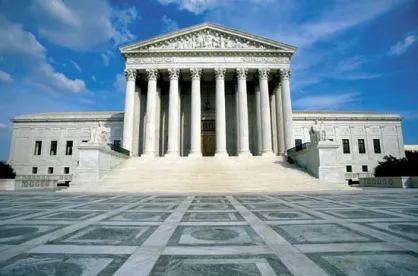On Monday, the U.S. Supreme Court granted certiorari and agreed to consider Robins v. Spokeo, Inc., in which the U.S. Court of Appeals for the Ninth Circuit held that Thomas Robins had adequately alleged Article III standing to sue website operator Spokeo, Inc. (“Spokeo”) under the Fair Credit Reporting Act (FCRA), 15 U.S.C. § 1681 et seq., for publishing inaccurate personal information about himself even though Robins did not allege any actual damages. The FCRA imposes various obligations on consumer reporting agencies (CRAs) and their handling of consumer reports, and it grants a consumer a cause of action against any person who willfully violates “any requirement imposed [under FCRA] with respect to [that] consumer.” 15 U.S.C. § 1681n(a).
Spokeo operates a website that provides users with information about other individuals, including contact information, marital status, age, occupation, economic health, and wealth level. Robins filed a putative class action alleging that Spokeo willfully violated the FCRA because the reports it generated contain inaccurate consumer information that is marketed to entities performing background checks. Specifically, Robins alleged that his Spokeo profile inaccurately stated that he was employed, possessed a graduate degree, and was wealthy. Robins alleged that he was out of work and seeking employment and that the inaccurate report has harmed his employment prospects.
Spokeo filed a motion to dismiss the complaint on the basis that Robins lacked standing because he did not allege that he in fact suffered an injury due to Spokeo’s alleged conduct. The U.S. District Court for the Central District of California granted Spokeo’s motion and concluded that a “[m]ere violation of [FCRA] does not confer Article III standing . . . where no injury in fact is properly pled,” and that “the alleged harm to [Robins’s] employment prospects” was too “speculative, attenuated and implausible” to establish standing. But on appeal, the Ninth Circuit reversed finding that Robins adequately alleged Article III standing because the statutory cause of action under the FCRA does not require a showing of actual harm when a plaintiff sues for willful violations — that is, violation of the statutory right created by the FCRA constitutes injury-in-fact.
Spokeo’s petition to the Supreme Court argued that “in those circuits where a harmless statutory violation has been held sufficient to confer standing, class actions presenting huge damages exposure based on harmless conduct will proliferate.” This argument was echoed by other website operators in amicus briefs. The case will be heard by the Supreme Court in the fall.
You can read more about this development here.



 />i
/>i

